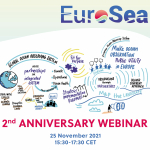An innovative sea level rise insights tool has been developed in EuroSea by our consortium member ARUP together with the University of Cambridge, the UK’s Environment Agency, and National Oceanographic Centre. Discover it in a short video at the end of this article! The tool helps to better understand and communicate the uncertainty in sea level predictions. It is giving new sea level rise insights exploring how uncertainty over future sea level rises can be captured in the economic decision process.
Typically, flood risk assessments only consider a limited band of the uncertainty of the sea level rise. The challenge with managing this risk is that as projections get further from the present day, the uncertainty of the prediction increases. In addition, discount rates applied in economic Net Present Value financial calculations also mean that the impacts of worst case scenarios later in the century have limited impact on decisions we are taking now. The University of Cambridge (UCAM) led the climate change impact modelling for this project using detailed sea level rise prediction information from the UK Climate Projections data in 2018 (UKCP18).
The modelling framework developed by UCAM incorporates sea level rise uncertainty into coastal flood risk assessment, by streamlining the process of modelling sea levels, wave overtopping and flood spreading on land. This allows all the uncertainty to be propagated through to the calculation of risk, driven by economic damages.
To quantify the flood hazard, reduced complexity models are used to allow a large number of scenarios to be run and all potential pathways of flooding considered at some level. By the end of the research, UCAM was running 21,300 scenarios in just 2 hours, which gave the Arup team new levels of data and new opportunities to improve insight for decision makers.
The sea level rise insight tool is designed to improve decisions on flood risk management and resilience. In the future the tool can potentially be applied to towns, cities and regions around the world so that they can make better decisions to prepare for climate change and, just as important, help explain these decisions to the public.
The text of this article is based on the ARUP announcement. To discuss how the sea level insights prototype could be applied to your region or location contact Michael Dobson.


